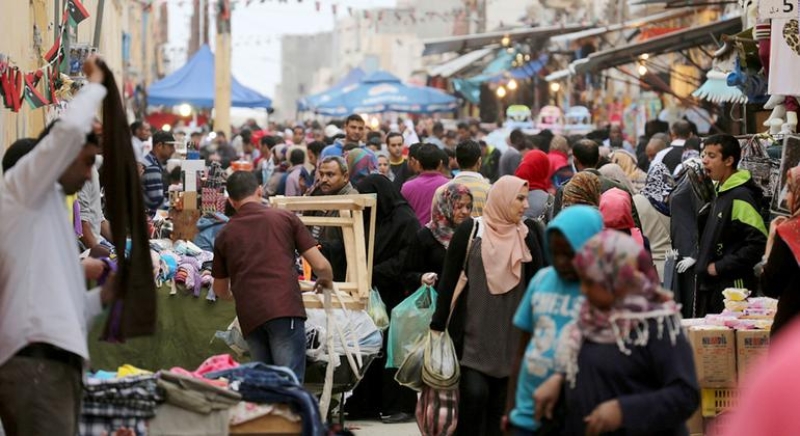- NCP Demands Impeachment, Arrest of President |
- PM Pledges to Modernise, Strengthen Border Force |
- Dhaka Tops Global Pollution List with Hazardous Air |
- Country Observes Martyred Army Day Today |
- 100 CSOs rally against Trump’s trade tactics, urge access to drugs |
Libya: UN Urges Support for Roadmap to National Elections

People gather at a market in Tripoli, the capital of Libya. (file)
Recent elections in Libya are a clear sign of the people’s desire to choose their own representatives, the UN Secretary-General’s Special Representative for the country told the Security Council on Thursday.
Hannah Tetteh, who also heads the UN Mission in Libya (UNSMIL), briefed ambassadors following last week’s municipal council elections and outlined a proposed roadmap to general elections, which should have taken place in 2021.
“The Libyan people look to this esteemed Council for help—to ensure a solution to the crisis and to support a political process that will result in elections and unified institutions, not a succession of transitional governments,” she said.
Nearly 15 years after the fall of former President Muammar Gaddafi, Libya remains split between two rival administrations: the internationally recognized Government of National Unity, based in the western capital Tripoli, and the rival Government of National Stability, headquartered in Benghazi in the east.
This past Saturday, 26 municipalities successfully held elections despite significant challenges. Ms. Tetteh commended the electoral management body HNEC and urged all candidates to accept the results.
She expressed regret that not all municipalities expected to participate were able to do so. Authorities in the east instructed the suspension of elections in 16 municipalities, and voting materials were withdrawn from centers across the region and the south.
Efforts to disrupt the vote also occurred in some western municipalities, where HNEC offices in three cities were attacked or set on fire, although elections still proceeded in two of them.
“By the end of polling day, voter turnout was 71 percent. This is a clear signal that the Libyan people are yearning to elect their representatives. In some areas, this was the first time any elections had taken place since 2014,” Ms. Tetteh said.
However, she added that the suspension of elections in the east and south is “an equally clear sign that not all are committed to supporting Libya’s democratic development,” and stressed the urgent need to reset the political process.
In February, UNSMIL established an Advisory Committee to recommend solutions for the unresolved issues preventing national elections.
A report was presented in May, followed by nationwide consultations and an online survey that drew over 22,500 responses.
“The message we clearly received was the desire to end the repeated transitional periods; preserve and strengthen the unity of the country and its institutions; renew their legitimacy through presidential and legislative elections; and end what was frequently referenced as foreign interference,” Ms. Tetteh told the Council.
Based on the committee’s recommendations, public feedback, and lessons learned from the failed 2021 elections, Ms. Tetteh proposed a roadmap built around three pillars:
A technically sound and politically viable electoral framework;
Unification of institutions through a new, unified government;
Structured dialogue to resolve critical issues and create a conducive environment for elections.
She estimated it would take 12 to 18 months to complete the roadmap, which would culminate in general elections. Preparatory steps include strengthening HNEC’s capacity and amending legal and constitutional frameworks.
“Following these steps—concluding in as little as two months if political will exists—there should be agreement on a new unified government capable of fostering credible elections and managing key governance functions,” she added.
Ms. Tetteh also reported on ongoing security concerns, including rising militarization by all parties.
She highlighted the fragile security situation in Tripoli, where clashes in May were followed by a tenuous truce that has since been violated multiple times, though without escalation.
UNSMIL has documented 20 deaths in custody since March 2024, including that of political activist Abdel Munim Al-Maremi, who died in Tripoli shortly after a release order had reportedly been issued.
“These cases reflect a widespread and persistent pattern of grave violations carried out with impunity across the country, including against migrants and refugees, sometimes fueled by disinformation and hate speech,” she said.
She also expressed alarm over the forced return of migrants to conflict zones, including Sudan, noting that the number of Sudanese refugees in Kufra now exceeds the number of local residents. Ms. Tetteh urged donors to increase support.

